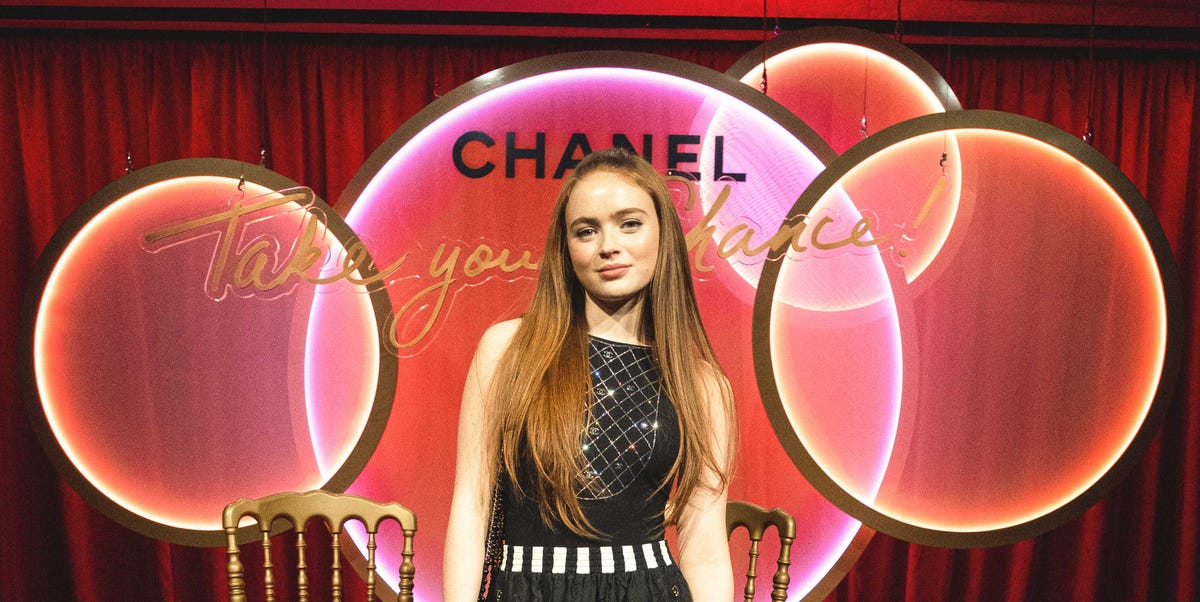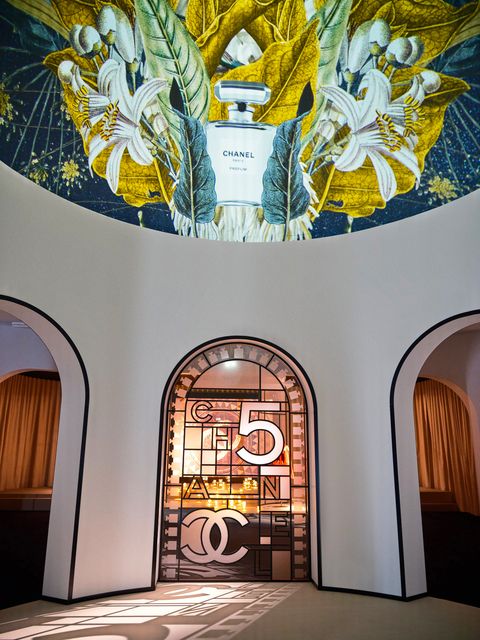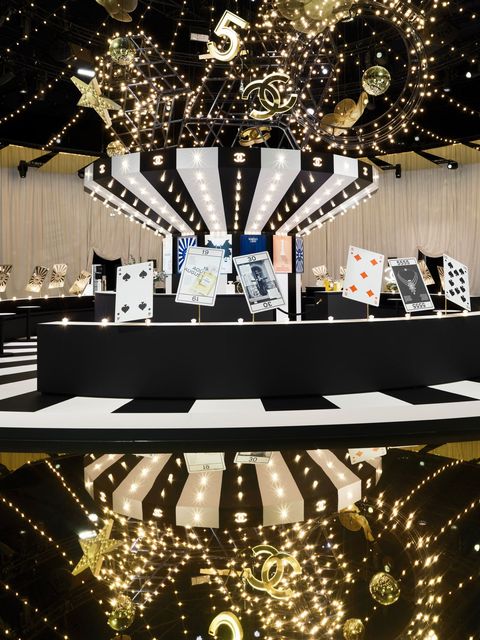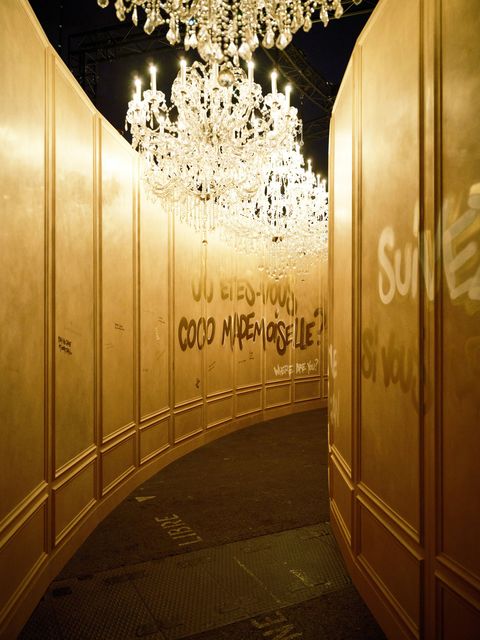You can smell perfume, but you can’t see it—or can you? Chanel’s newest fragrance exhibition in Paris, Le Grand Numéro de Chanel, allows you to do both. The exhibition features a series of experiences that will tickle the heart of any perfume lover or perfume explorer through a mix of cabaret, live music, art installations, fashion displays from the archives, and virtual reality immersions. (We have a feeling Emily in Paris would definitely be first in line to visit).
In real life, celebrities such as Sadie Sink, Keira Knightley, and Marion Cotillard visited the exhibition. Sink told me, “In today’s world, you can go into a big beauty store and smell 60 different fragrances to try. In this exhibit, you slow down and get to better appreciate every single little detail.” Case in point: Inside the main room, you can find interpretative dancers twisting and turning with bottles of Chanel N°5 (and even magicians). Head to the smaller break-out rooms, each headlined by a major Chanel fragrance, and you’ll experience card games, live-action chess games, and fragrance psychoanalysts who can match you with scents based on your personality. The visuals are all so very TikTok-friendly.
ELLE talked to Chanel’s house perfumer Olivier Polge to learn more about the secrets of Chanel N°5, as well as the surprises to be found in the exhibition. You can visit the exhibit in Paris starting now through January 9; make a reservation here.
What would you say is the best way for someone to experience the exhibition?
Don’t have very preconceived ideas. Just be yourself and come with your history and personality. Hopefully, you will discover perfumes differently. There are often perfume exhibitions with commercial posters or empty bottles. As we manufacture our perfumes ourselves, we really wanted to have, aside from all those visual aspects, a real experience of scents. In preparing for the exhibition, we tried to figure out which perfumes and which ingredients to show, if any. But we found that the best way to smell perfumes was not to be overexposed to them. We smell better if it’s the correct amount of perfumes. It’s always dangerous to fragrance the whole room.
What’s the “correct amount” of perfume?
Would you be able to smell 70 perfumes, or better to show about 10 that you will remember well?
Did anything surprise you about the exhibition?
What surprises me the most, and I saw the exhibition for the first time yesterday, was the space and how big it is. I cannot wait to see the comments from everyone who will visit. People are often very unconscious about all the scents that surround them.
It’s often been said that you’re writing a biography of Chanel via fragrance. How do you think the exhibition contributes to telling that story?
Perfume and fashion were two different worlds, and [Gabrielle] Chanel was the first one to come up with a perfume with her own name. She saw it as a different way to express herself—her personality and her style. My intention is never to tell, or to go too much into the history. Gabrielle’s history has been translated into her style. Often, when people ask me, “Where do you find your inspiration?” I say, “This is more a way of being. When you are creative, everything inspires you.” This is why I prefer to speak about style and history, but it’s maybe a little bit the same. When you think about new scents, it’s important that it makes sense and that it resonates somehow to the others. It would be a pity to ignore that.
We came up with a line, Les Eaux de Chanel, and I liked it very much, because when you think about scents, you always picture someone with a scent, or places. Those are things that anchor scents into your mind. As I was thinking about the scents, I realized that all those destinations evoked images and started to build something in Chanel’s style. For example, Chanel went to Venice in the 1920s, and this is probably where she developed a taste for the Venetian art that you see often in certain pieces of jewelry.
You’ve also said that perfumes are a language. Do you come up with phrases or words when you’re creating scents?
The opposite. I have nothing to say. It’s difficult to speak about perfumes. Yes, the language of a perfume is scents. They express things. They make a mark on yourself that words will not do. I’m not saying it’s better. I think it’s interesting to say, because these are things we cannot explain.
What do you think the exhibition would say, if it could talk?
If the exhibition could talk, I would hope that it would tell you something you didn’t know.
You’ve worked with Karl Lagerfeld before, and now with Virginie Viard. How would you describe the difference in the way that the two approach fragrance or think about fragrance?
They are so different that it’s difficult to see overlaps. Karl was quite passionate about perfumes. The last time I saw him, I was afraid he would speak to me about a perfume I didn’t know. He knew every perfume out on the market for the past 50 years. I’m exaggerating a bit, but in his early life, he had worked with or for [Jean] Patou when he was very young, and Patou came up with many, many perfumes. He knew about perfumes that don’t exist anymore, so he was quite an expert.
What would you say are the main factors that give Chanel N°5 its timelessness?
First of all, it’s a great perfume, with an identity that you organize right away. Gabrielle Chanel has said that with N°5, she wanted an artificial perfume—meaning one that doesn’t represent exactly the scent of jasmine or a rose, but that is more abstract [and] probably more mysterious.
There is something about Chanel N°5 that you cannot grasp. I think it’s beyond the raw materials. We preserve N°5 with its original raw materials. We even bought certain jasmine fields to make sure that we would have the quantities at the quality we need. On the one side, we are always very careful to preserve N°5 in its original iteration, but also work regularly with new interpretations, to try to bring something new within No°5 as well. We constantly maintain N°5 as if it was a new perfume, and that helps.
I also like to remember that Gabrielle Chanel herself was the first face of N°5. There was a picture of her in the first commercial. Then, in the 1950s, Marilyn Monroe said that all she would wear at night would be a few drops of N°5. All those things go beyond our planning.
Would you describe other perfumes at Chanel as being artificial?
Yes. When I say artificial, I mean abstract—we don’t try to do Rose by Chanel or Vetiver by Chanel. We always try to express something else. I would say that about all our perfumes to a certain extent. That is a signature of Chanel fragrance. And the other important thing is this composed aspect—artificial—but that goes all the way to raw materials that are selected or transformed, in the way we extract them. We twist the identity of nature. We are never trying to reproduce nature.
This interview has been lightly edited and condensed for clarity.
Kathleen Hou is the beauty director at Elle Magazine.



